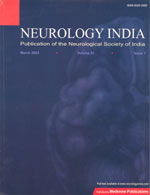
|
Neurology India
Medknow Publications on behalf of the Neurological Society of India
ISSN: 0028-3886
EISSN: 0028-3886
Vol. 50, No. s1, 2002, pp. S37-S49
|
 Bioline Code: ni02161
Bioline Code: ni02161
Full paper language: English
Document type: Research Article
Document available free of charge
|
|
|
Neurology India, Vol. 50, No. s1, 2002, pp. S37-S49
| en |
Critical Care Management of Acute Stroke
A.K. Meena, A. Suvarna, S. Kaul
Abstract
Treatment of acute stroke in an intensive care unit improves the outcome by reducing the mortality and morbidity. In addition to the primary neurological condition that affects the outcome, the secondary complications and associated co-morbid conditions also influence the outcome. It is essential to monitor and maintain the general physiological conditions in the neurologically sick patients. Maintenance of a clear airway is important to prevent hypoxic insult to the brain in stroke patients whose airway is compromised. Mean arterial blood pressure should be maintained > 110mm of Hg. The choice of antihypertensive is labetolol. Drugs causing raised intracranial pressure (ICP) should be generally avoided. Cardiac arrhythmias should be monitored and treated. Treatment of ICP by osmotic agents is the usual practice. Hyperventilation is reserved for patients who are coning and is only a temporizing measure prior to surgery. Hemicraniectomy in malignant middle cerebral artery territory infarcts reduces the mortality significantly. Insulin therapy may be required to maintain a normoglycemic state for preserving the functionally impaired neurons. Infections should be treated by appropriate antibiotics. Care should be taken to prevent aspiration, and deep vein thrombosis. Intravenous thrombolysis for the eligible candidates and Aspirin for the rest is the recommended therapy for acute ischemic stroke.
Keywords
Acute stroke, Intensive care, Hypertension, ICP.
|
| |
© Copyright 2002 Neurology India. Online full text also at http://www.neurologyindia.com
Alternative site location: http://www.neurologyindia.com
|
|
